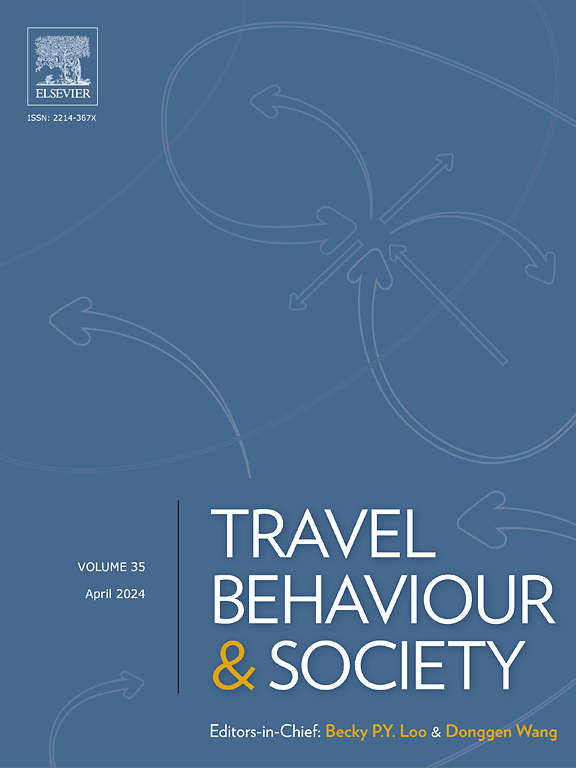连续与网络耦合空间下城市共享单车短期需求预测
IF 5.7
2区 工程技术
Q1 TRANSPORTATION
引用次数: 0
摘要
共享单车系统支持可持续城市发展,准确的需求预测对于高效运营至关重要。以往的研究主要是在欧几里得空间或自行车站点之间建立共享单车需求的空间依赖性模型,但往往忽略了城市交通网络形成的需求的拓扑依赖性。地铁和自行车网络可以通过与共享单车系统的功能连接来影响共享单车的使用。为了解决这一差距,本研究提出了一种新的深度学习框架GeoTopo-Net,以改进城市自行车共享系统的短期需求预测。与现有的解决方案不同,GeoTopo-Net联合建模了连续空间和网络空间中出行需求的依赖关系。该模型利用卷积神经网络(cnn)捕获城市区域与其周围环境之间的空间依赖关系,同时整合图卷积网络(GCNs)来建模城市交通网络引入的拓扑依赖关系。我们对全球五个城市的评估表明,GeoTopo-Net显著降低了预测误差,RMSE降低了8.9%,MAE降低了6.8%,MAPE降低了5.9%。结合对地铁网络的依赖,在高需求地区和地铁站附近产生了显著的改善。这些发现强调了将城市交通网络结构纳入共享单车需求预测的重要性。GeoTopo-Net架构还可以用于改进对不同类型的旅行需求(例如,网约车、电动汽车充电需求)的短期预测,这些需求涉及连续和网络空间中复杂的相互依赖关系。本文章由计算机程序翻译,如有差异,请以英文原文为准。
Predicting short-term urban bike sharing demand in a coupled continuous and network space
Bike sharing systems support sustainable urban development, with accurate demand prediction being essential for efficient operations. Previous studies have primarily modeled spatial dependency of bike sharing demand in Euclidean space or among bike stations, but often overlooked topological dependency of demand shaped by urban transportation networks. Metro and cycling networks could influence bike sharing usage through their functional connections with bike sharing systems. To address this gap, this study proposes GeoTopo-Net, a novel deep learning framework to improve short-term demand forecast for urban bike sharing systems. Different from existing solutions, GeoTopo-Net jointly models dependencies of travel demand in both continuous and network spaces. The model utilizes convolutional neural networks (CNNs) to capture spatial dependency between urban areas and their surroundings, while integrating graph convolutional networks (GCNs) to model the topological dependency introduced by urban transportation networks. Our evaluation across five global cities shows that GeoTopo-Net significantly reduces prediction errors, by up to 8.9% in RMSE, 6.8% in MAE, and 5.9% in MAPE. Incorporating dependencies from metro networks produces notable improvements in high-demand areas and those near the metro stations. These findings highlight the importance of incorporating urban transportation network structures in bike sharing demand forecast. The GeoTopo-Net architecture can also be adapted to improve short-term forecast for different types of travel demand (e.g., ride-hailing; electric vehicle charging demand) that involve complex interdependencies in continuous and network spaces.
求助全文
通过发布文献求助,成功后即可免费获取论文全文。
去求助
来源期刊

Travel Behaviour and Society
TRANSPORTATION-
CiteScore
9.80
自引率
7.70%
发文量
109
期刊介绍:
Travel Behaviour and Society is an interdisciplinary journal publishing high-quality original papers which report leading edge research in theories, methodologies and applications concerning transportation issues and challenges which involve the social and spatial dimensions. In particular, it provides a discussion forum for major research in travel behaviour, transportation infrastructure, transportation and environmental issues, mobility and social sustainability, transportation geographic information systems (TGIS), transportation and quality of life, transportation data collection and analysis, etc.
 求助内容:
求助内容: 应助结果提醒方式:
应助结果提醒方式:


